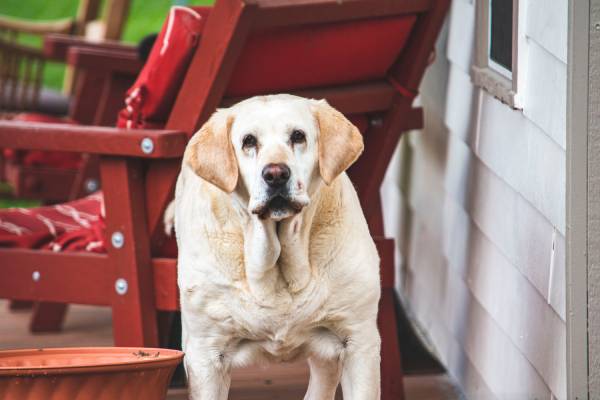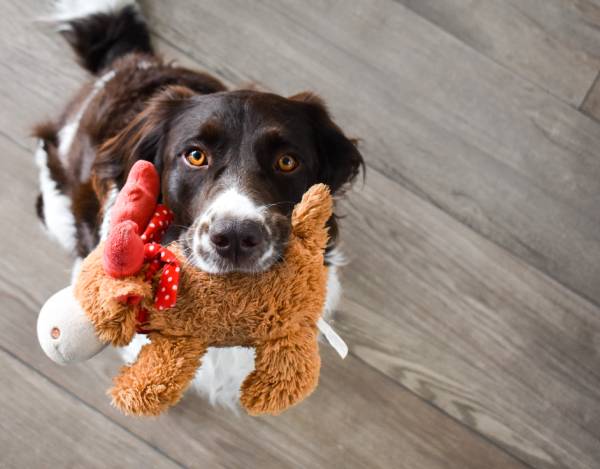
I am yet to meet a person who didn’t wish their dog could live forever. What if I told you there are things you are doing that are actually shortening your dog’s life?! I expect you would be horrified! There are several things you might be doing that are unintentionally shaving years of your dog's life. Avoiding these seven things will ensure you are giving your dog the best chance to live a long and happy life.
1. Letting Your Dog Gain Too Much Weight
2. Not Taking Care of Their Teeth
5. Not Keeping Up to Date With Preventatives
1. Letting Your Dog Gain Too Much Weight
Recent studies have estimated that over half of all dogs are overweight and concerningly, 95% of owners of overweight dogs incorrectly said their dog was at a healthy weight. This is very concerning as even a few extra kilograms can dramatically reduce your dog’s lifespan. The extra kilos will also put unnecessary pressure on their joints and may increase their risk of developing diabetes, cancer, high blood pressure or liver or kidney disorders.
It is easy to forget our dogs are smaller than us and overfeed them or reward them with one too many treats. To help put things into perspective, try thinking of their treats as chocolate bars, would you eat multiple chocolate bars a day? Not judging if you would but you know it isn’t very healthy for you and you probably don’t feel so great after eating half a dozen bars of Cadbury’s best. If you are having trouble cutting down your dog’s treats, try swapping them for small portions of fruit or vegetables.

2. Not Taking Care of Their Teeth
Gum disease is incredibly common in dogs and it has been estimated that around 85% of dogs over the age of 5 are affected. Not only does the build up of plaque and bacteria give your dog bad breath and cause problems with their teeth. Gum disease can also lead to heart and kidney problems when the bacteria in their mouth enters the bloodstream. Brushing your dogs’ teeth should be a part of your overall grooming routine, just like brushing their fur.
For more information on doggy dental disease and how to banish the bad breath, check out our dental supplies category here.

3. Skipping Annual Vet Visits
Annual vet visits are a crucial component of your dog’s care as they can help you to detect diseases or illnesses before they begin to affect your dog. Your vet can also advise you on your dogs’ weight, their dental care routine and administer any recommended vaccinations.

4. Not Exercising Them Daily
Regular exercise will help to keep your dog happy and healthy and reduce their chance of becoming overweight or developing health conditions such as arthritis, heart conditions and more. Getting out of the house on a daily basis (if you can), will also help to keep the boredom at bay and is a good way for your dog to let off some steam instead of taking it out on your brand-new couch. They also enjoy the mental stimulation from going on a walk, taking in all of the wonderful smells of the neighbourhood or even the chance to say hi to a new doggy friend.
On the days you can’t make it out of your house, try some of these games to entertain your dog.

5. Not Keeping Up to Date With Preventatives
It is so easy to protect your dog, whether that be with the annual heartworm vaccine, 4-monthly Bravecto chew for protection from paralysis ticks and more, or monthly Simparica Trio for protection from heartworm, paralysis tick protection and more. Shop our range of heartworm preventatives here and our flea and tick preventatives here.

6. Not Socialising Your Dog
Dogs that aren’t given the opportunity to socialise with other dogs can often become depressed, develop fear or anxiety issues or even dermatological issues. Not all dogs want to hang out with other dogs all the time, so only do it as often as your dog seems ok with it. Don’t have any friends with dogs? Pop on down to the dog park (after school or work are peak times) or enroll your dog in puppy preschool or dog obedience lessons. Join a dog lovers Facebook group for your suburb or city and schedule a doggy playdate with your dogs’ new best friends.

7. Not Spaying or Neutering
Different veterinarians, breeders and dog owners will all have differing opinions on the best age to desex your dog. Ultimately, there are several factors that should be considered when you are deciding on when to desex. Spaying and neutering has many health benefits and will reduce your dogs’ risk of developing cancer, especially mammary cancer in female dogs and testicular cancer in male dogs. It may also help to alleviate any behavioural issues such as inappropriate urination or a desire to escape your yard. This will need to be balanced against the breed of the dog and whether or not they are fully grown at the age the desexing is to be completed.
